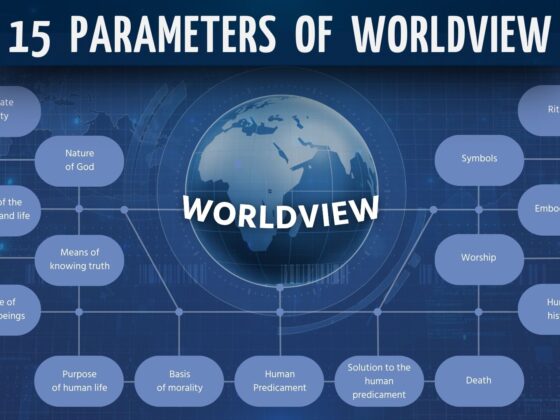The True Nature of Humanity: Understanding Worldviews in Education
February 18, 2025
Katherine Schultz
What is the true nature of human beings, and how does this shape the worldview of your students?
Understanding human nature is essential to developing a biblical worldview in education. The way we view human beings—our identities, our purpose, and our relationships—greatly influences how students approach life, learning, and their personal growth. By exploring the nature of humanity, we can better guide students in their journey toward discovering who they are in Christ and living out their calling.
The question of human nature is foundational because it shapes how we perceive ourselves and our purpose. Every worldview—whether naturalism, pantheism, or biblical Christianity—answers this question differently. Each of these answers has profound implications for students’ behaviors, attitudes, and spiritual growth.
In this post, we’ll explore how different worldviews shape students’ perceptions of human nature and how you can assess and nurture a biblical worldview in your students. The 3-D Worldview Survey offers a unique way to understand students’ beliefs, behaviors, and attitudes, allowing educators to guide them toward a more complete understanding of human nature through a biblical lens.
Note: This article is part five in a 15-part series about the parameters of a worldview. You’ll find links to the other articles at the end of this blog post as they become available. If you haven’t read the previous worldview parameter articles, start with part 1 here: Ultimate reality.
Understanding Human Nature Across Different Worldviews
The nature of human beings has been debated for centuries, with differing worldviews offering distinct answers. Let’s examine three major worldviews and how they shape students’ understanding of who they are.
Naturalism / Secular Humanism: The Human as a Complex Machine
According to naturalism, humans are simply highly evolved animals, nothing more than complex biological systems subject to the laws of nature. This worldview sees no inherent purpose beyond survival and reproduction. Students influenced by naturalism may view themselves as machines, driven by instincts rather than spiritual or moral responsibility.
For example, Genesis 2:7 tells us that “the Lord God formed a man from the dust of the ground and breathed into his nostrils the breath of life, and the man became a living being.” This verse highlights that human beings are not mere biological processes; we are divinely created and endowed with life by God Himself.
Pantheism / New Age: Humans as Spiritual Beings, Part of the Divine
Pantheism sees humans as spiritual beings, part of a greater universal consciousness or divine source. In this worldview, reality is interconnected, and humans are reflections of a divine essence. Students who adopt this view may see themselves as divine manifestations or expressions of an impersonal God, which can lead to an unclear understanding of their personal identity, purpose, and sinfulness.
Ecclesiastes 3:11 offers a biblical perspective on our spiritual nature: “He has made everything beautiful in its time. He has also set eternity in the human heart; yet no one can fathom what God has done from beginning to end.” While pantheism might suggest that humans are part of a divine whole, this verse affirms that God has instilled eternity in our hearts, pointing us to something greater than ourselves.
Theism / Biblical Christianity: Humans as Physical-Spiritual Beings Created in God’s Image
Biblical Christianity teaches that humans are physical and spiritual beings created in God’s image. This worldview emphasizes inherent worth and dignity, recognizing that every person is created for a purpose and has the ability to make moral and spiritual choices. Students who embrace this worldview understand their identity as bearers of God’s image and are called to live according to His moral order.
Genesis 1:26-27 states, “Then God said, ‘Let us make mankind in our image, in our likeness… So God created mankind in his own image, in the image of God he created them; male and female he created them.’” This verse confirms that we are more than just physical beings—we are created in God’s image, which imbues us with purpose and moral responsibility.
The Implications of Worldview on Student Identity and Behavior
A student’s worldview shapes not only their beliefs about human nature but also their behavior. How a student views themselves—whether as a machine, as a divine being, or as an image-bearer of God—directly impacts their choices and actions.
Why Worldview Matters
Understanding a student’s worldview is essential because it affects how they navigate the world around them. Students who adopt a naturalistic view may lack a sense of moral responsibility, as they may see their actions as driven purely by biology. In contrast, students who view themselves as part of the divine may struggle to acknowledge their sinfulness and the need for redemption.
Behavioral Connections
For instance, students who see themselves as nothing more than biological machines may have difficulty understanding the moral implications of their actions. They might lack an internal moral compass or disregard responsibility for their choices. On the other hand, students who perceive themselves as divine manifestations may struggle with concepts like sin, repentance, and grace because their worldview does not account for human fallenness.
Romans 12:2 offers a powerful reminder of how a biblical worldview transforms us: “Do not conform to the pattern of this world, but be transformed by the renewing of your mind. Then you will be able to test and approve what God’s will is—his good, pleasing and perfect will.” A biblical worldview calls us to be transformed by the renewing of our minds, allowing us to understand who we are in Christ and live in alignment with His will.
Spiritual Growth Implications
To nurture spiritual growth in students, educators must guide them toward a biblical understanding of human nature. By doing so, students can begin to see themselves as God sees them—worthy of His love and redemption, capable of making moral choices, and called to live out their identity in Christ.
Jeremiah 17:9 highlights the importance of understanding the human heart: “The heart is deceitful above all things and beyond cure. Who can understand it?” Without a proper understanding of human nature, students may be led astray by their own deceitful hearts. A biblical worldview, however, helps them recognize their need for Christ’s redemption and transformation.
How Can You Assess and Guide Your Students in Developing a Biblical Worldview?
As an educator, it’s crucial to assess your students’ worldviews and guide them toward a biblical understanding of human nature. Tools like the 3-D Worldview Survey can provide valuable insights into students’ beliefs, behaviors, and attitudes. By understanding where students stand in their worldview development, you can better mentor them toward spiritual maturity.
Assessment of Worldview Maturity
The 3-D Worldview Survey can offer a comprehensive look at where students are in their worldview development, helping educators identify areas for growth. This tool can illuminate how students view human nature, their moral beliefs, and their understanding of their purpose in life.
Proverbs 22:6 encourages us to mentor students in their faith: “Start children off on the way they should go, and even when they are old they will not turn from it.” By helping students form a biblical worldview, we set them on the path of righteousness, equipping them for a lifetime of spiritual growth.
Encouraging Active Discipleship
It’s not enough to assess students’ worldviews; educators must actively engage in discipleship. Mentoring students toward a deeper understanding of their purpose, identity, and moral responsibilities is essential. This requires intentional relationships, where educators model biblical principles and guide students in their walk with Christ.
Practical Steps to Develop a Biblical Worldview in Your Students
Once you understand your students’ worldviews, it’s important to take concrete steps to help them develop a biblical worldview. Here are a few practical steps you can take as an educator:
Incorporate Worldview Discussions in the Curriculum
Embed worldview questions into your curriculum to challenge students to reflect on their beliefs. Regular discussions about human nature, morality, and purpose can help students evaluate and refine their worldview in light of Scripture.
Modeling Biblical Worldview
As a school leader, your actions speak louder than your words. Model a biblical worldview through your leadership, interactions with students, and daily life. Be a living example of what it means to live according to God’s moral order.
Spiritual Formation Opportunities
Provide students with opportunities for spiritual growth through prayer, worship, and community engagement. These experiences will help them internalize the biblical principles you teach and form a deeper connection with their identity in Christ.
Colossians 3:10 reminds us that we are “being renewed in knowledge in the image of its Creator.” The more students learn about their Creator, the clearer their sense of purpose and identity will become.
Next Steps for Gaining Insights into Your Students’ Worldviews
If you’re ready to dive deeper into understanding your students’ worldviews, the next step is to explore the 10 Questions to Understand Worldview PDF. This resource will help you assess where your students stand and guide you in nurturing a biblical worldview.
Additionally, the 3-D Worldview Survey provides a deeper, more nuanced understanding of students’ beliefs and spiritual maturity. By using this tool, you’ll gain data that can be applied to more effective discipleship and mentoring.
James 1:5 encourages us to seek wisdom from God: “If any of you lacks wisdom, let him ask of God, who gives generously to all without reproach.” As you invest in your students’ spiritual formation, trust that God will provide the wisdom and guidance you need to lead them effectively.
What Is the 3-D Worldview Survey?
- Take the 3-D Worldview for yourself
If you haven’t yet used the 3DWS with your class, check out the [lead magnet] below to get started.
#biblicalworldview #spiritualformation #3dworldview
You might also enjoy reading Understanding Human Nature: Are We Basically Good or Bad?
Key Takeaways
- Worldview Shapes Identity and Behavior: A student’s understanding of human nature—whether they view themselves as biological machines, divine manifestations, or image-bearers of God—profoundly influences their actions, moral choices, and sense of purpose.
- Biblical Worldview Promotes Spiritual Transformation: Embracing a biblical worldview, where humans are created in God’s image, helps students recognize their inherent worth, moral responsibility, and need for redemption, leading to spiritual growth and maturity.
- Assess and Guide Students’ Worldviews: Educators can use tools like the 3-D Worldview Survey to assess students’ worldview maturity and provide targeted discipleship that fosters a biblical understanding of human nature, purpose, and identity.





